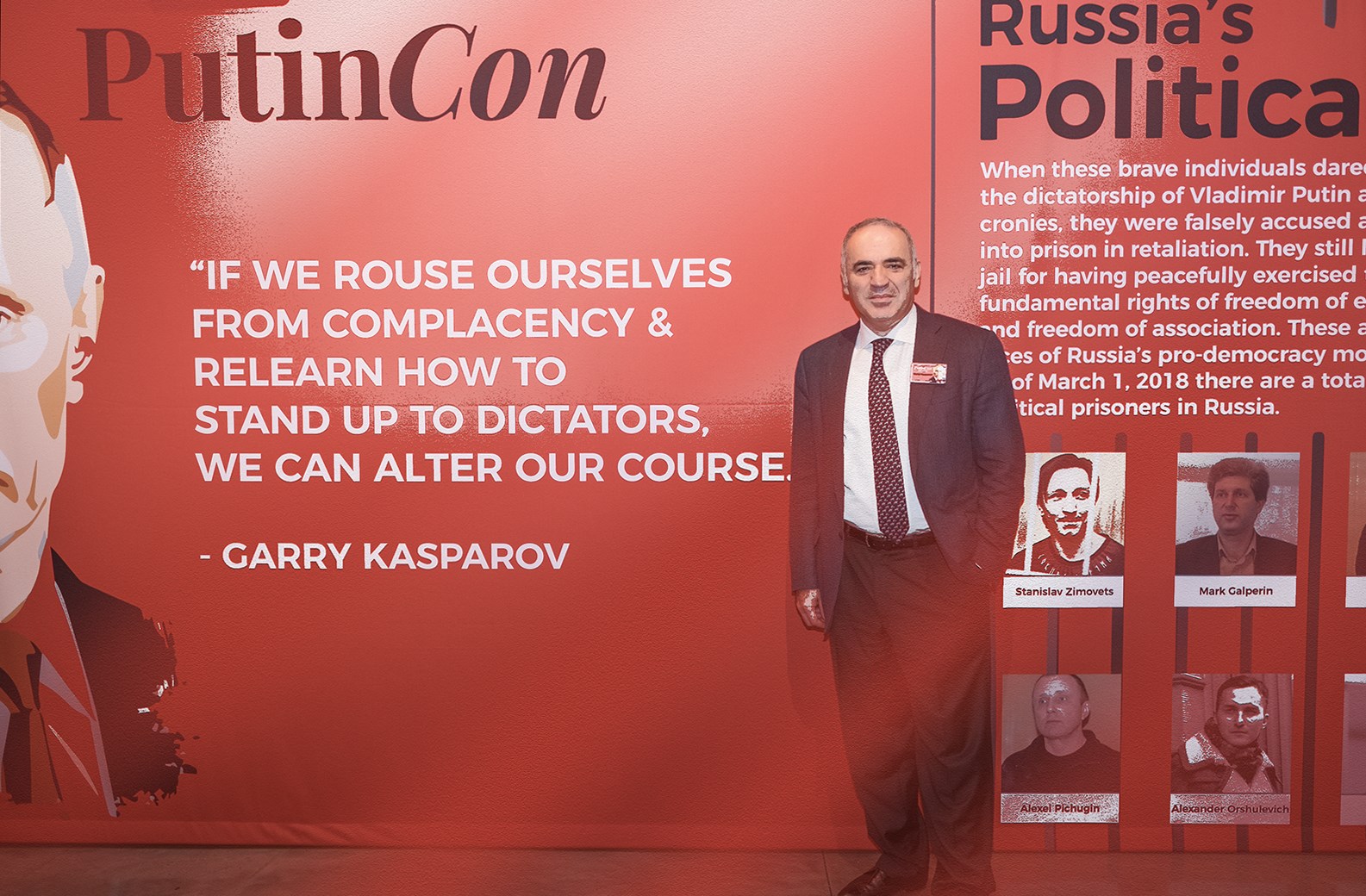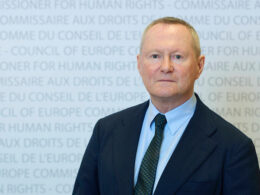The Parliamentary Assembly of the Council of Europe suspended Russia's right to vote in 2014. Since then, the Russian delegation has refused to participate in the work of the Assembly. In June, two years will have passed since the country stopped paying its financial contributions. The Committee of Ministers will have to deal with the case from that date at the latest. Russia has set conditions that it expects to be met before it resumes fulfilling its membership obligations. Otherwise, the country threatens to leave the organization. Instead of accommodating Russia as it has in previous months, the Council of Europe should consistently adhere to its principles and be prepared to bear the political and financial costs.
Russia was admitted to the Council of Europe in 1996. Even then the situation was anything but simple. Because the actions of the Russian leadership in the first Chechen war caused concern, accession was delayed. Although Russia ratified the European Convention on Human Rights in May 1998, fundamental violations of human rights have remained a serious problem. After 23 years of membership, Russia is still subject to the full monitoring procedure, which provides for regular visits and reports by persons appointed by the Parliamentary Assembly (PACE). The number of complaints lodged with the European Court of Human Rights (ECtHR) during these years has not decreased. The reasons for the complaints to the Court remain the same because the Kremlin has not eliminated the underlying structural problems in the Russian legal system.
As a reaction to the annexation of the Crimea and the Russian intervention in the Donbas, PACE suspended the voting rights of the Russian delegation in April 2014. Although it would have had the right to continue to participate in the debates and in the work of most committees, the delegation has since withdrawn from all PACE bodies. As a result, dialogue with the Russian side within the framework of the PACE has become impossible.
In June 2017, Russia also stopped paying its contributions to the Council of Europe. As a good seven percent of the institution's budget is thus lacking, the result is substantial cuts that have long-term effects. The Council of Europe's youth work, for example, is threatened with collapse.
If a member fails to pay contributions for two years, the Committee of Ministers, in which all 47 member states are represented, undertakes a review of the situation. In concrete terms, this means considering whether and under what conditions Russia's membership can be maintained.
Face-saving offers
The steps taken by the Russian side are more of a threat than an offer of dialogue. Nevertheless, the PACE has tried to find a way for Russia to return to its place in the Assembly in a face-saving way. Most significant was a reform proposal that would have mitigated the consequences of a future suspension of the right to vote and made it much more difficult to refuse the annual accreditation of a PACE delegation. After a heated debate in the PACE in October 2018, the reform document was referred back to the relevant committee. The latter subsequently decided that the suspension of voting rights should not apply to the election of ECtHR judges or that of the Secretary General. The latter point is especially relevant because a new Secretary General will be elected in June 2019.
The decisions taken by the Committee were rejected by the Russian leadership as insufficient. It demands the full reinstatement of the Russian delegation’s voting rights and a guarantee that these rights cannot be withdrawn in the future.
A second attempt in April 2019 was to propose that the procedure for imposing sanctions on a member state be designed in such a way that more actors (PACE, Committee of Ministers, Secretary General) would have to be involved. This would make it considerably more complicated and require more time to sanction Russia's PACE delegation in the event of a new accreditation attempt. The resolution finally adopted stipulated that the new mechanism should merely provide an additional procedural option, not a replacement for the current procedure.
The exact implications of the resolution are still unclear and are likely to be an issue at the meeting of the foreign ministers in Helsinki on 16 and 17 May. Meanwhile, Leonid Slutsky, Chairman of the Duma Committee on International Affairs, has stated that the resolution could pave the way for a return of the Russian delegation to the PACE. However, this would only be possible if a change to the PACE’s procedural rules ensured that national delegations could no longer be sanctioned in the future, according to his statements. [Editor's note: in the weeks after the publication of this article, on 17 May, the resolution was adopted on the ministerial meeting with an overwhelming number of votes. Read more: Looks like 1938: how Berlin and Paris made a step towards lifting sanctions on Russia in PACE [/box]
Arguments for and against Russia’s exclusion
None of the attempts to find a way out of the current impasse have been successful so far. In mid-May, the Committee of Ministers will deal with the question of Russian membership. It can continue its search for a way to persuade Russia to fulfill its obligations, but it can also signal its willingness to initiate Russia’s exclusion under Article 8 of the Council of Europe Statute.
Active members of Russian civil society vehemently argue for their country to remain in the Council of Europe. They are concerned that the human rights situation would deteriorate considerably if Russia were to leave the Council of Europe because it would no longer be bound by the European Convention on Human Rights. In their opinion, the Council of Europe would also lose weight and influence without Russia. Finally, they fear the reintroduction of the death penalty in Russia.
Their biggest concern, however, is the loss of influence that the ECtHR has on Russia. The ECtHR offers Russian citizens an important opportunity to appeal to an independent court outside the country, and in most cases, they emerge victorious. Should Russia (have to) leave the Council of Europe, not only would the legal route to Strasbourg be blocked, but it would also be much more difficult for Russian lawyers and judges to invoke ECtHR rulings in their case law or in defense cases. The loss would also be noticeable in the area of legal education.
These concerns must be taken seriously, but they are based on an argument which focuses too exclusively on the situation in Russia. In a broader perspective, dangers can be identified that are even more far-reaching. With its behavior in and towards the Council of Europe, Russia has abundantly demonstrated that it is actively working to weaken the basic principles of the organization.
The Russian delegation has used PACE more as a platform for making statements than as an opportunity for constructive dialogue. It was also primarily concerned with softening criticism of Russia. The Russian delegation frequently joined forces with others to avoid such criticism. Such behavior undermines PACE's ability to set standards and norms in important democratic and rule-of-law issues.
This is all the more serious in view of the fact that democratic principles and the rule of law are increasingly being jeopardized in other European countries as well. As a pan-European institution which sees itself as a guarantor of these principles, the Council of Europe should clearly and emphatically stand up for democracy and the rule of law.
If exceptions are created for Russia, or if the country succeeds in changing the Council of Europe's rules in such a way that violations of its obligations go unpunished or become the norm, this will have a domino effect. Other Member States will be encouraged to ignore their obligations as well. After all, Russia is far from being the only problematic Member State. Worthy of particular mention are Azerbaijan, whose delegation is involved in a corruption scandal involving other members of the PACE, and Türkiye, where the human rights situation has clearly deteriorated in recent years. Türkiye has also rescinded its voluntary grand payeur status and has become an ordinary contributor. This is in line with its obligations but puts additional pressure on the Council of Europe budget.
For the Council of Europe, the most serious consequence of tolerating Russian behavior would thus be a massive loss of credibility which would have effects both within and outside the organization. This development would be accompanied by a dangerous erosion of democratic principles and the rule of law, which could sooner or later call into question the raison d'être of the Council of Europe.
The Council of Europe can do without Russia if necessary
Russia's response to previous face-saving offers to resume fulfillment of its obligations indicates that its representatives are consciously raising the stakes. They know that many of the relevant actors, including the Secretary General of the Council of Europe Thorbjørn Jagland, want to avoid a Russian withdrawal. As a price for staying in the Council of Europe, Russia, therefore, expects substantial concessions, especially as regards its voting rights in the PACE. There is no sign of the Kremlin's willingness to change the behavior sanctioned at the time.
As a rule, the Russian leadership is reluctant to abandon international formats that convey a certain prestige and confer the status of a "member of the club". In this case, however, it cannot be ruled out that Russia will leave the Council of Europe on its own initiative since membership is accompanied by increasing criticism of the behavior of the leadership in Moscow. However, the Russian side has not yet given up its efforts to persuade the Council of Europe to fulfill its conditions.
If Russia does not leave the Council of Europe of its own accord, a fundamental decision will have to be made. Will the organization take further steps to accommodate Russia, or will it move in the direction of exclusion? An end to their country's membership would be a bitter loss for important parts of Russian society. For them, connections to foreign actors who support them in their struggle for human rights and democracy are extremely important. Especially if access to the ECtHR were to cease, this would be a severe deprivation for Russian citizens.
The Council of Europe should, therefore, halt its development of further offers and increase pressure on Russia to take its obligations as a member of the organization seriously and to respect its rules. Together with other EU Member States - for example, France, which will chair the Committee of Ministers for six months starting in mid-May - Germany should declare its willingness to pay higher contributions so that the Council of Europe does not have to forego important programs in the event of a Russian withdrawal. The Council of Europe's credibility must take precedence over the membership of a single state. In this respect, the Committee of Ministers should be prepared, if necessary, to initiate Russia's expulsion in order to protect and strengthen the organization as a whole.

Read also:
- Russia ignores PACE resolutions to end aggression against Ukraine. So PACE prepares to lift sanctions
- Looks like 1938: how Berlin and Paris made a step towards lifting sanctions on Russia in PACE
- Russia’s return to PACE would end Council of Europe as human rights instrument – Ukraine’s ambassador to CoE
- Reforming PACE rules of procedure must not lead to a weakening of the current sanctions regime
- Open letter of lawyers & foreign policy experts: stop efforts to weaken Council of Europe’s powers to sanction violators
- Relatives of Ukrainian hostages of the Kremlin ask PACE to prevent lifting Russia sanctions
- Rebecca Harms: Germany and France should stop supporting Russia’s unconditional return to PACE
- Russia ignores PACE resolutions to end aggression against Ukraine. So PACE prepares to lift sanctions
- How PACE wants to change its rules to lift sanctions on Russia
- CoE Secretary General Jagland now openly lobbies for return of Russian delegation





